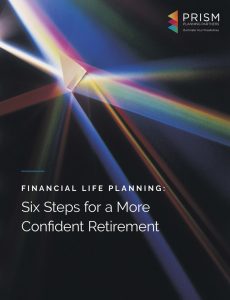As a small business owner in Libertyville, Illinois it is important that you keep on top of your business’s finances, of course. But you should also optimize your personal finances so that your entire economic life is well-managed and working for you at all times. What’s the best way to do that?
Are you on the right financial path? Contact Prism Planning Partners today for a consultation!
Here are the five best financial tips for people who own a small business.
#1 Contribute to an emergency cash fund
Even the most successful businesses are subject to downturns or seasonal fluctuations. If the economy goes south or you lose a major client, what would you do to keep your mortgage and other bills paid? Your answer may be: “turn to my emergency cash fund to ride out the storm.”
Many financial advisors should tell you that an emergency fund should equal at least three months’ worth of expenses. Without some cash stashed away for a rainy day, you could be forced to shutter your business or take another job just to stay afloat financially.
Keeping the money liquid, in easily withdrawable bank or money market accounts, may be a good idea. In other words, reconsider placing the amount in volatile accounts (like stock funds) or vehicles that may impose restrictions on when you can access it, like certificates of deposit (CDs). You want a stable amount that you can access easily, or it doesn’t fulfill the goals of an emergency fund.
#2 Save prudently for retirement
Many small business owners plow all their available cash into the business. But prudent financial planning requires that you also contribute to your retirement. You may want to retire someday, and a time-tested way of making sure you have adequate retirement funds is to save over decades.
In addition, approximately 20 percent of all small businesses fail. (1) If that should happen, you don’t want all your funds tied up in the business. It’s just good sense to have a retirement nest egg.
Consider setting up a retirement plan that lets you save more than the $6,000 of an individual retirement account (2) (IRA), which rises to $7,000 if you’re 50 or older. Self-employed people can contribute to a Simplified Employee Pension IRA (SEP-IRA), for instance, which allows contributions of up to 25 percent of your compensation or $57,000 for 2020 (3). If you employ people, you’ll need to fund SEP-IRAs for all your employees as well.
It is important to choose your asset allocation strategies for retirement funds wisely. Working with a financial advisor can help with this. There are many options available such as stocks, bonds and cash instruments, such as money market accounts and CDs.
#3 Separate your personal and business assets
Sometimes small business owners commingle their business and personal assets (especially when just starting out), but that is typically never a good idea financially. At the simplest level, it can make tax returns and other accounting much more complicated and difficult than it has to be. Plus, should your business incur liabilities or encounter financial difficulties, your personal financial security can be imperiled. You don’t want that!
So, it may make sense to take steps to separate your personal and business assets. Set up separate bank and credit card accounts. Then, talk to an attorney or business advisor about your company’s structure. Structures such as C corporations, S corporations and limited liability companies (LLCs) may offer some protections for business owners from personal liability for debts incurred or injuries caused by the corporation.
#4 Maximize your tax advantages
Smart business owners may benefit from maximizing their tax advantages. Talk to a financial advisor or accountant about the best ways to do that for your business. The Tax Cuts and Jobs Act (4), for instance, contained significant benefits for business owners, including a pass-through deduction that allows you to deduct a much as 20 percent of business income. (5)
Many business decisions, such as leasing rather than purchasing equipment or owning versus renting your premises, can also unlock tax benefits. So can your choice of retirement plans for employees. Don’t make a decision about retirement accounts for employees without consulting a financial advisor and tax professional about the potential tax consequences, or you may be missing out on tax savings that will benefit both your business and your employees.
#5 Manage credit wisely
It is important to manage both your personal and business credit wisely if you’re a small business owner. (And perhaps keep the accounts separate!)
Many businesses need loans, lines of credit or other financial products to expand or stay robust. But financial institutions like banks look at credit scores and credit histories very closely when approving loans and other products. If your credit score and history, either on the personal level or business level, show signs of past or current struggle, you can be turned down for a loan. Even if you receive one, the terms, such as interest rates and length of loans, may be far less advantageous if your financial institution doesn’t see signs of a good credit history.
So, consider paying your personal bills and your company bills promptly. Not paying bills on time may hurt your credit score and credit history. Your credit utilization ratio is also highly important. A credit utilization ratio measures how much of the credit available to you is actually in use. A high measure indicates to financial institutions that you are maxed out. They don’t like to lend to folks that really need the money to stay afloat, because it indicates to them that you may be a poor risk to repay the money.
If your credit score or history needs work, on either the personal or business level, you can take active steps to improve it. Find out what your score is and what categories, if any, need improvement. Take steps to improve them.
Prism Planning Partners, LLC dba Prism Planning Partners is an SEC Registered Investment Advisor. We are located in Libertyville IL. We specialize in comprehensive financial planning and investment management. We are a group of CERTIFIED FINANCIAL PLANNER™ professionals dedicated to helping our clients achieve their retirement goals. Contact us today.
 Download our eBook today!
Download our eBook today!
SOURCES:
- Chamber of Commerce: Small Business Statistics, 2020 https://www.chamberofcommerce.org/small-business-statistics/
- IRS Retirement Topics – IRA Contribution Limits Page Last Reviewed or Updated: 07-Feb-2020 https://www.irs.gov/retirement-plans/plan-participant-employee/retirement-topics-ira-contribution-limits
- IRS SEP Contribution Limits Page Last Reviewed or Updated: 09-Jan-2020 https://www.irs.gov/retirement-plans/plan-participant-employee/sep-contribution-limits-including-grandfathered-sarseps
- IRS Tax Reformhttps://www.irs.gov/tax-reform Page Last Reviewed or Updated: 03-Apr-2020
- Fishman, Stephen The 20% Pass-Through Tax Deduction for Business Owners https://www.nolo.com/legal-encyclopedia/the-new-pass-through-tax-deduction.html



